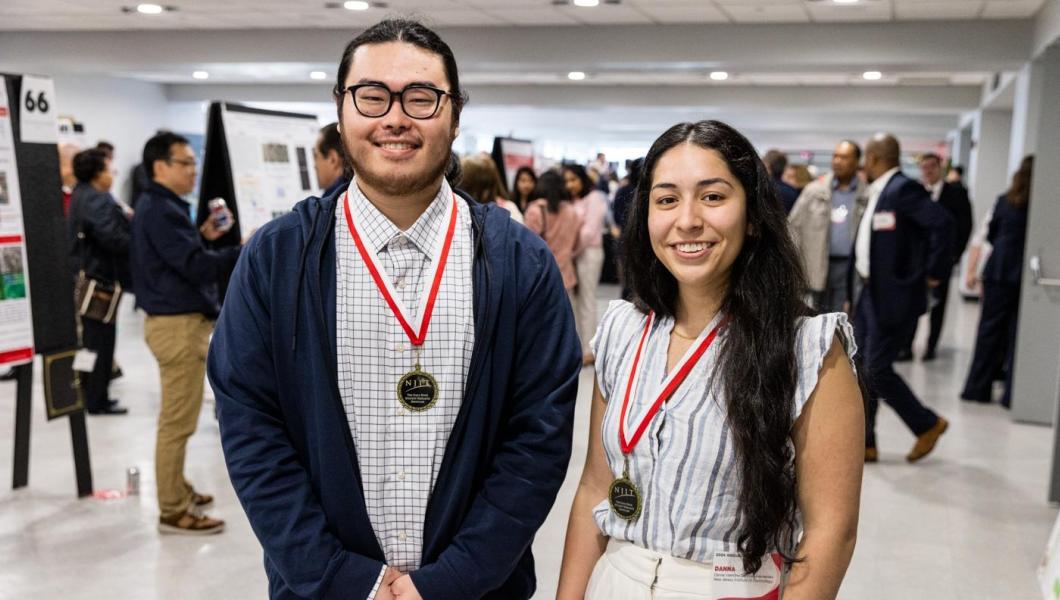NJIT's Newest Research Center For Community Systems Joins Hillier College

Hillier College is the new home to NJIT’s latest research center – the Center for Community Systems. Under the direction of Dr. Colette Santasieri, the mission of the Center for Community Systems (CCS) is to be a resource and conduit for creating thriving, sustainable, and resilient communities.
As communities exist within the context of varying and ever-evolving social, economic, political, and cultural conditions, the Center for Community Systems (CCS) serves as a strategic platform for connecting innovative planners, engineers, environmental scientists, social scientists, architects, and economists with government, industry, and community organizations to solve complex problems.
The Center for Community Systems has a broad array of focus areas that include: brownfields redevelopment; community sustainability, resilience and revitalization; transit oriented development; transportation planning; port-city relationships; and sustainable practices for the natural and built environment.
Some of CCS’s projects have had immeasurable impacts, in that they addressed complex and multidimensional issues in an integrated fashion. An example of this is their ‘Planning for the Liberty Corridor’. Spanning from Passaic County to Monmouth County, with the Port of New York and New Jersey at its core, this corridor is a federally designated Corridor of National and Regional Significance. With a focus on unlocking the potential of a region where the port, brownfields redevelopment, universities, and research and development are brought together to create a corridor that is driven through innovation, Santasieri and colleagues created a management and implementation plan that set a vision for the region’s future, prioritized infrastructure projects, and gained $88 million in federal funds for highway, bus and rail transportation projects. In addition, research was conducted pertaining to green/environmentally sustainable practices and technologies; and the identification of brownfield sites which may have the potential for redevelopment for Liberty Corridor related activities such as warehouse/distribution centers or locations for green technology businesses.
A cornerstone of the Center for Community Systems is its two brownfield technical assistance programs. Since 2008, NJIT has served as a US Environmental Protection Agency (EPA) provider of technical assistance to brownfields (TAB) communities. The nationally recognized NJIT TAB Program has provided free technical assistance to hundreds of state, regional, county, tribal, and local governments and nonprofits in 21 states, two US territories, Washington DC, and 31 tribal nations. NJIT TAB’s subject matter experts provide technical assistance to communities, helping them overcome challenges posed by brownfields, and build community capacity for successfully redeveloping their former industrial and commercial properties into new community assets.
In recognition of NJIT’s impressive history of helping communities successfully take on transformative brownfields redevelopment projects, the NJ Economic Development Authority granted funding to NJIT to establish the NJ Brownfields Assistance Center @ NJIT. The NJ Brownfields Assistance Center @ NJIT is the first-of-its-kind center that solely focuses on and serves New Jersey’s communities as they strive to transform their former industrial and commercial properties into community assets. This Center educates and engages communities about brownfield issues. It provides free “help desk” assistance and guidance to any NJ county or municipal government challenged with navigating the cleanup and redevelopment processes, and it develops tools and resources for both the public and private sector, including developers, consultants, and other brownfield practitioners.
The activities of the Center for Community Systems are diverse. The Center conducts applied research, and it designs, develops, and deploys technical assistance, tools, resources, as well as educational and engagement programs with communities in an effort to improve environmental conditions, spur economic development, and advance social equity.
The Center for Community Systems designs and conducts many community engagement and educational forums on a variety of topics. For example, in an effort to improve communications between the Delaware Department of Natural Resources and Environmental Conservation, and Environmental Justice communities, CCS created an interactive workshop that integrated multiple (and often unheard) voices and perspectives in defining the problems and designing the solutions. CCS’s “Transit Oriented Development Community Workshops” provided key ingredients to encouraging and enabling the creation of sustainable communities around transit stations. CCS’s “Brownfield Blueprints Learning Labs” are virtual workshops designed to demonstrate how communities can transform potentially contaminated, former industrial and commercial properties into community assets, including housing, open space, health care facilities, and more.
An example of CCS’s community revitalization planning is the Jefferson Davis Corridor Assets and Needs Study conducted for the City of Richmond, Virginia. The major four-mile corridor through the city was the subject of a revitalization plan. CCS’s staff conducted workshops to engage the community, identified brownfield sites that could catalyze economic development and meet the community’s needs, and determined redevelopment potential along the corridor.
CCS creates tools, how-to videos, and guidance on a variety of topics. In an effort to help property owners and local governments navigate the NJ brownfields regulatory process, CCS developed a series of info-graphics that explain the process of identifying, assessing, cleaning up contaminated properties. CCS also created “Tools and Guidance for Implementing Infill Development on Brownfield Sites in Rural Areas and Small Towns”, and a “Green Stormwater Infrastructure Decision Tree” for the City of Philadelphia.
While the Center has a new home and a new name, Dr. Santasieri and her multidisciplinary team of professionals have been providing these multidimensional services on behalf of NJIT throughout the United States for over 15 years.
The Center for Community Systems is led by Executive Director Colette Santasieri, PhD, Director Sean Vroom, and Project Managers Gary White and Melissa Dulinski. The Center is a cross-disciplinary, cross-university collaboration with affiliate faculty from HCAD, the College of Science and Liberal Arts, and the Martin Tuchman School of Management.



